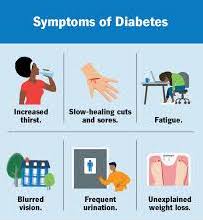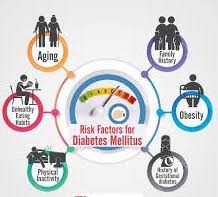
Symptoms of Diabetes

Individuals can experience different signs and symptoms of diabetes, and sometimes there may be no signs. Some of the signs commonly experienced include:
You're taking more bathroom breaks
When you have diabetes, your body becomes less efficient at breaking food down into sugar, so you have more sugar sitting in your bloodstream, says Dobbins. Your body gets rid of it by flushing it out in the urine. That is why you are going to the bathroom a lot.
You're thirstier than usual
Urinating a lot will also make you feel parched. A common symptom Dobbins sees with patients is that they use drinks like juices, soda, or chocolate milk to quench their thirst. These sugary beverages then pack the bloodstream with excess sugar, which can lead to the problem all over again.
You've lost a little weight
Considering that being overweight is a risk factor for diabetes, it sounds counterintuitive that shedding pounds could be a sign of the disease. Weight loss comes from two things, One, from the water that you lose [from urinating]. Two, you lose some calories in the urine and you don't absorb all the calories from the sugar in your blood.
You feel shaky and hungry
It is not uncommon for patients to suddenly feel unsteady and immediately need to reach for carbs. When you have high blood sugar, your body has a problem regulating its glucose. If you have eaten something high in carbohydrates, your body shoots out a little too much insulin, and your glucose drops quickly. This makes you feel shaky, and you tend to crave carbs or sugar. This can lead to a vicious cycle.
You're tired all the time
Of course you are exhausted every now and then. But ongoing fatigue is an important symptom to pay attention to. it might mean the food you are eating for energy is not being broken down and used by cells as it is supposed to.
You're moody and grumpy
When your blood sugar is out of whack, you just do not feel well, and might become more short-tempered. In fact, high blood sugar can mimic depression like symptoms. Your cuts and scrapes heal more slowly The immune system and the processes that help the body heal don not work so well when your sugar levels are high.
Your feet tingle
Elevated sugar levels can cause complications well before you realize you have diabetes. One of these is mild nerve damage, which can cause numbness in your feet.


